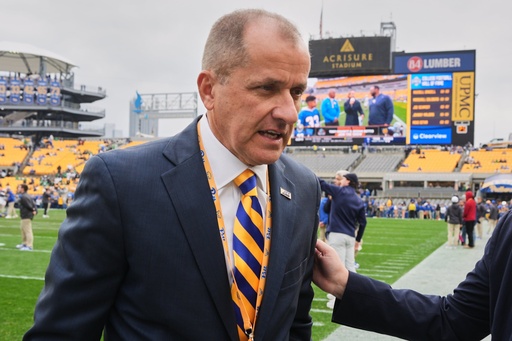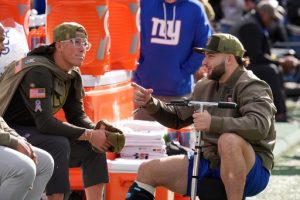CARY, N.C.
By AARON BEARDAP Sports Writer
Atlantic Coast Conference commissioner Jim Phillips says the league has been freed to focus on the future after resolving legal fights with two member schools earlier this year. The settlement with Clemson and Florida State came in March. That deal included a new revenue-distribution model that factors in TV viewership into payouts to league members. In an interview with The Associated Press, Phillips called the months since the settlement a “welcomed period” that “allowed us to get back to work” on league priorities amid the changing landscape of college athletics.
CARY, N.C. (AP) — The Atlantic Coast Conference opened 2025 mired in a legal fight with two member schools while waiting on broadcast partner ESPN to extend a media deal with the league for the long term.
Those issues long resolved, the league has been focused on the future, building its brand with the arrival of revenue sharing and adapting to the constantly shifting landscape of college athletics.
“It's been a welcomed period,” Commissioner Jim Phillips said. “And one that has been sensational because it's allowed us to get back to work on the things that we really have set for priority.”
The Associated Press shadowed Phillips during his weekend travels to Pittsburgh for the Panthers' football game against Notre Dame as the league faces challenges in landing more than one bid to the College Football Playoff for a second straight year. The AP also tagged along with Phillips to the ACC men's soccer championship match in the league's home state of North Carolina.
In an AP interview, Phillips reflected on a number of topics, from the lawsuits filed by Clemson and Florida State to the league's move to a nine-game football schedule, its new revenue-distribution model and pulling back the curtain on replay reviews during game broadcasts.
“It’s really hard to put into description all of the areas that have been freed up because of a period of time that had us frozen, if you will,” Phillips said. "I’m exceptionally proud of how we worked ourselves through that. We continued to stay level, continued to be a league that serves its membership, never took anything personally — though it was easy to do that if you wanted to.
“Because there was this goal of a better outcome, and bluer skies ahead that you were longing for. And that's where we got ourselves. We're doing well, we just are."
The pressing focus remains trying to bolster league revenues.
The ACC keeps posting record hauls and payouts, reporting $711.4 million in revenue for tax documents covering the 2023-24 sports year and an average of nearly $45 million to each of its 17 football-playing members. Yet the league lags behind the Big Ten ($928.1 million, $63.1 million) and the Southeastern Conference ($839 million, $52.6 million), though ahead of the Big 12 ($493.8 million, $39.5 million) to rank third among the Power Four.
That's been a challenge Phillips has faced since taking over from John Swofford in February 2021. There have been smaller moves, including hiring the league's first chief revenue officer, landing more corporate sponsorships and starting elevated hospitality offerings at ACC championship events.
There have been two major steps.
One was expansion to add California, SMU and Stanford, triggering roughly $600 million in additional incremental gains through the life of the ACC's ESPN deal.
The other has been a departure from decades of equal-distribution payouts among league members.
There was last season's launch of a “success initiative" allowing league schools to keep more money generated by their own postseason success, which could lead to a bump of $20 million to $25 million for a school in a big year. The ACC reported 15 of its 18 schools — Notre Dame is a football independent but a member of all other league sports — earned some payout from that in Year 1, estimated to range from around $100,000 to $8 million.
Then came this year's change with a revenue-distribution model that now factors in TV viewership, which theoretically would boost the league's biggest brands like Clemson, FSU and Miami in football; or Duke, Louisville and North Carolina in men's basketball.
Phillips has touted those changes as incentives for schools to invest toward elevating their programs, or to schedule marquee matchups with must-watch TV appeal, avenues available to all.
“We've been very progressive," Phillips said. “We're looking ahead and feel as if it is very innovative, and that over a course of time, you're likely to see other leagues doing something similar.”
The ACC was the first college league to let viewers listen live to replay reviews during select game broadcasts, shining a light on the frame-by-frame discussions that determine whether a call will stand or be overturned.
“Both of these things, whether it’s the financial distribution or the replay, there’s risks involved when you’re making changes to what traditionally has been the way you do things," Phillips said.
“We’ve certainly heard from our TV partner that it’s been a huge success, with the responses that they've gotten,” Phillips continued. “I can’t tell you the number of people that have written me or stopped me and just said, ’Hey, Commissioner, what you’ve done with the replay is just exceptional.'”
Another priority for Phillips has been getting men's basketball back in line with its tradition-rich history.
After a record nine bids to the NCAA Tournament in 2017 and 2018, the ACC has seen a sagging total in years since — down to four last season for the lowest March Madness total since 2013 — even while regularly making deep runs and putting four different schools in the Final Four in the past four seasons.
The league took a step in May by reducing its 20-game league schedule to 18, offering teams more room to add quality nonconference matchups that would help scheduling strength and the ACC's overall stature.
League teams combined to go 58-10 through the first two weeks of the season, with power-conference wins that included No. 5 Duke beating Texas, No. 6 Louisville beating Kentucky, and No. 18 North Carolina beating fellow blueblood Kansas.
The league has another AP Top 25 team in No. 25 N.C. State under Will Wade. He's one of the league's four new coaches, continuing a sideline overhaul following the retirements of NCAA champions like Duke's Mike Krzyzewski, UNC's Roy Williams, Syracuse's Jim Boeheim and Virginia's Tony Bennett.
Additionally, league teams have posted 16 100-point outputs in nonconference play as of Monday's games, compared to 12 for the SEC and 10 for the Big Ten as the next closest power conferences, according to SportRadar. The ACC reached that threshold only 11 times all last year.
“I'm really pleased,” Phillips said. “We're better. There's no question our league is better. … I'm excited about the year because we've started out in a really strong manner."
__
This story has been corrected to show ACC has hired its first revenue officer, not financial.
__
Get poll alerts and updates on the AP Top 25 throughout the season. Sign up here and here (AP News mobile app). AP college football: https://apnews.com/hub/ap-top-25-college-football-poll and https://apnews.com/hub/college-football





